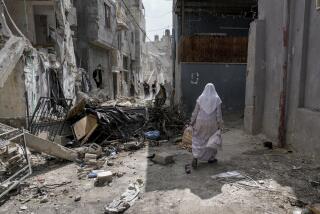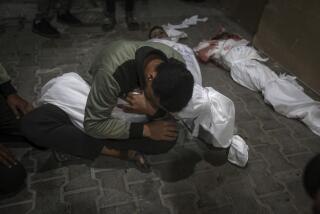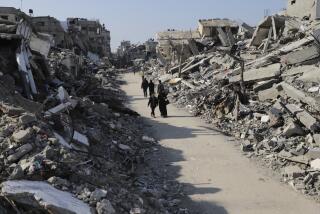Israel’s onslaught sends Gaza death toll well past 500
Israeli forces pummeled Gaza Strip towns with airstrikes and artillery Monday, pushing the Palestinian death toll in two weeks of fighting well past 500 and sending civilians streaming from their homes, many with little more than the clothes they were wearing.
The Israeli military reported seven of its soldiers had been killed in the last 24 hours, four of them by an antitank missile fired by Palestinian militants dressed in Israeli military uniforms who slipped across the border through one of the tunnels Israeli forces are trying to destroy.
Ashraf Kidra, a Gaza health official, said early Tuesday that the Palestinian death toll stood at 576. Twenty-seven Israelis have died, all but two of them soldiers killed since the Gaza ground operation began Thursday after a week of airstrikes.
The rising death toll has increased pressure on Israel and the Islamic militant group Hamas, which controls the Gaza Strip, to end the fighting. United Nations Secretary-General Ban Ki-moon and U.S. Secretary of State John F. Kerry headed to Cairo on Monday to try to persuade the sides to reach a cease-fire. Traditionally, Egypt has served as an intermediary between the two sides.
At least in public, neither appeared ready to stop fighting.
Heavy shelling around the northern towns of Beit Hanoun and Beit Lahiya sent people fleeing south Monday, among them the Oda family.
An Israeli tank round aimed at a neighbor’s house brought a pile of rubble tumbling down on the Odas’ house in Beit Lahiya, family members said. Their tin roof collapsed under the weight, trapping 12-year-old Alaa and her seven siblings under the debris.
“We were screaming for help,” the girl said.
Her father dug them out with his bare hands and took them to their grandparents’ house. But no sooner did they arrive than shelling started there too. So they joined the crowds hurrying south as fast as they could.
“We couldn’t get our shoes, our clothes, nothing,” said the 12-year-old, who walked barefoot for two hours until the family found a United Nations-run school that would take them in.
More than 100 Palestinians died in each of the last two days as fighting intensified.
Israeli officials say they do all they can to minimize civilian casualties and accuse Hamas of putting Palestinian civilians in harm’s way.
An Israeli airstrike on a high-rise tower in Gaza City killed at least 11 people, including five children, health officials said. Another strike killed 11 members of a family in the southern town of Rafah, they said. Rescuers searching the wreckage of a house targeted late Sunday retrieved 28 bodies in the town of Khan Yunis, also in the south.
Tank shells were also fired at Al Aqsa Hospital in the central town of Deir Balah, killing at least four people and injuring about 70, said Kidra, the health official. The upper floors were severely damaged. As medical staff were trying to evacuate patients to other hospitals, more shells were fired at the ambulances, forcing them to abort the effort, Kidra said.
The Israeli military said an initial investigation indicated that a cache of antitank missiles was stored in the immediate vicinity of the hospital.
“Civilian casualties are a tragic and inevitability of the brutal and systematic exploitation of homes, hospitals and mosques in Gaza,” the Israel Defense Forces said in a statement. “While the IDF takes every possible measure to minimize civilian casualties, Hamas and its deliberate tactic of embedding terrorist activities within the urban environment is ultimately responsible.”
The militants managed to infiltrate Israel for the third time in two days. Roads were blocked and residents of several nearby communities were instructed to lock themselves in their homes while the army searched houses and the countryside for any remaining attackers.
Ten of the militants were killed in an airstrike, the Israeli military said, while Hamas reported that two made it back to Gaza unharmed.
Israeli military officials have said that the number of rockets fired from Gaza toward Israel has decreased in recent days, but they say it is too soon to know if it is a trend. More than 100 rockets and mortar rounds streaked over the border Monday, according to the military, but they caused no injuries.
More than 2,000 projectiles have been fired at Israeli territory from Gaza during the conflict.
The top Hamas leader in Gaza, Ismail Haniyeh, vowed that the territory would be “the graveyard of the invaders.”
“The resistance is not going to give up its demands, because they are the demands of the Palestinian people,” Haniyeh said in a speech.
Those demands included the lifting of a blockade imposed when Hamas took over the territory in 2007 and the release of prisoners captured by Israel in a crackdown after the recent kidnapping and killing of three Israeli teenagers in the West Bank.
The slaying of the Israelis and the suspected revenge killing of a Palestinian teenager sharply increased tensions between the two sides.
Diplomats were looking for a formula to stop the fighting. Before Israel invaded Gaza, Egypt had proposed a cease-fire. Israel accepted it but Hamas, which is suspicious of the current Egyptian leadership, said it had not been consulted and rejected the idea. Egypt is now reported to be considering a reopening of its Rafah border crossing with Gaza, which could ease the Palestinian territory’s isolation and provide Hamas with a way out.
Israeli leaders said the aerial and ground campaign would continue until the concealed shafts that burrow into its territory have been identified and destroyed.
“This mission cannot be completed until the strategic threat of tunnels is lifted,” Israeli Cabinet member Gilad Erdan told reporters outside Barzilai hospital in Ashkelon on Monday. He said Israel’s military should remain in the northern border region of Gaza until arrangements could be made to “demilitarize” the Palestinian enclave in the long term.
But others have indicated that the campaign could reach its objective within days, providing Israel with an exit if it is looking for one.
At a news conference late Sunday with Israeli Prime Minister Benjamin Netanyahu, Defense Minister Moshe Yaalon said he estimated the majority of tunnels would be destroyed in two or three days.
Times staff writer Zavis reported from Gaza City and special correspondent Sobelman from Jerusalem.
More to Read
Start your day right
Sign up for Essential California for news, features and recommendations from the L.A. Times and beyond in your inbox six days a week.
You may occasionally receive promotional content from the Los Angeles Times.







